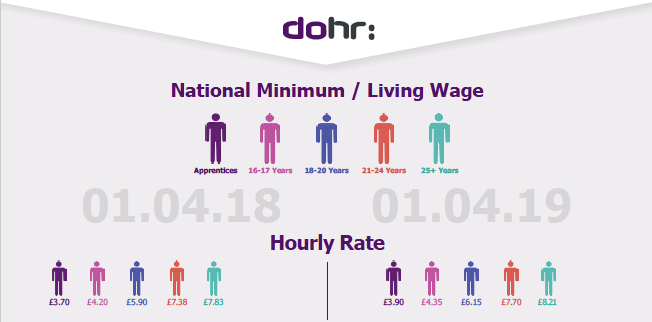The National Minimum Wage, known as the National Living Wage for over 25s, is probably one of the most significant changes in Employment Law of the past few decades. For many it was a huge step forward for workers’ rights in the UK and one of the main achievements of Blair’s government.
It has not been without its problems, of course.
As a business owner, your greatest cost is most likely your staff. So when the National Living Wage increased from £7.83 to £8.21 in April, for many it significantly increased your monthly outgoings.
But it’s not just the financial challenge as a result of the annual increase, it’s the HR issue of what to do with everyone else. The change in April represented a 4.9% increase in wages over the year, while the latest figure for wage increases for the average worker was 3.3%. That’s a large disparity, and it has been this way for the past few years. The academic research has borne out what many of us know anecdotally, that there is a compression in wages between the bottom and the average.
This means the gap in salary between staff members on minimum wage and their managers is closing as time goes on.
So what can you as a business owner do about it?
You could increase the salaries of your managers by a similar amount, but of course this is going to be a very expensive option, and if their performance doesn’t warrant the increase, or if your business can’t afford it then it’s not a viable or desirable option.
You could look at other benefits for staff with long service, and at a higher level in the company. Extra annual leave could come with greater service or seniority, sick pay beyond the statutory entitlement, even rewards like private medical insurance could be an option to boost engagement while keeping staff sickness to a minimum.
Consider why your staff are where they are. Presumably if they’re in the more senior roles in your organisation it is because they care about their careers and they want to develop themselves. Look at what training and development opportunities you can offer your more senior staff, what responsibilities you can give them to challenge them and to help build their career. They’ll be better managers for it too. The rewards of having a more senior role do not just have to be a higher salary.
Whatever you do, don’t try to flout the rules. Even if your employees consent you can’t pay them less than the national minimum wage. In 2017 a bakery was investigated for deducting £1 per week from each employee, with their consent, to cover tea and coffees rather than them bring the money in. It took their staff below the NMW, and HMRC named and shamed them for breaking the law.
Pay is an emotional, financial and business decision which sits at the very centre of your business success. Make sure you get your pay strategy right, and that it is aligned with your long and short term business goals.

This week’s blog was first written by our HR advisor, Michael Mason for our Winter 2018/19 newsletter. This is a quartlery publication sent to our clients.
For more information about becoming a DOHR client, please email [email protected]





